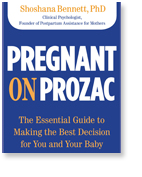You are currently browsing the category archive for the ‘pregnancy’ category.
Colic. Every parent’s nightmare.
At the hospital, everything’s cool. Baby coos, you ahhh, nurses help.
But once you bring baby home and through that front door, you’re all on your own. Heaven help you once all hell breaks loose.
Baby’s screaming, your bladder is full, tummy is rumbling, the dog has to go outside NOW, the phone starts to ring, the UPS guy is dropping off a super-belated gift from Aunt Martha, and oh yeah, the cable guy is here because for some reason the cable isn’t working. And don’t forget dear little Tommy banging his plastic chiming hammer against the china cabinet while contemplating peeing in the floor along with the dog (who, by the way, is now barking up a storm at the UPS guy knocking on the door).
Once you get the UPS package inside intact, ignore the phone (that’s why you have voicemail, right?), take the dog AND Tommy outside to pee after strapping the still-screaming baby to your chest, you start to breathe again. Sort of.
Three hours later, baby’s still crying and you’re half-way to bald as you desperately google “How to make a baby stop crying.” Change the diaper. Check. Feed. Check. Burp. Check. Rock. Check. Sing. Check. CHECK CHECK CHECK!
A colicky baby is enough to make even the sanest of parents wish for a pair of Bose Silencing Headphones. But they’re the lucky ones. Yes, I said lucky ones.
You see, depressed parents are almost two times more likely to have a colicky baby than non-depressed parents. Hey – kinda like hitting the lottery, right? But wait – does the colic cause the depression? Nope. According to Mijke van den Berg, a child psychiatrist at Erasmus Medical Center in the Netherlands, the parents were screened for depression before birth.
So what’s the deal then?
Dr. van den Berg states that her study is not definitive and more information is needed to draw a firmer conclusion. But the conclusion to me doesn’t really seem fair to depressed dads. It lays on an even bigger guilt trip. Or perhaps this would serve as motivation to seek therapy if your wife gets pregnant – yanno – to avoid the whole unexplained screaming for more than three hours a day baby thing. Wouldn’t that be the chivalrous thing to do, especially if you’re the one working?
By the time baby gets here, moms and dads are already worn thin. Why on earth would we get a colicky baby to top things off? For fun?
Bottom line here folks, if you’re feeling gloomy, angry, irritated or upset and finding it’s interfering with your daily routine for more than a couple of weeks, please seek help. Talk to someone, anyone. Even if it’s a casual mention to your wife’s OB. He or she may be able to refer you to a trained professional. It’s not shameful to get help. It’s powerful. It’s the right thing to do…for you and for your kid.
Today we’re featuring an excerpt from Dr. Shosh’s latest book, Pregnant on Prozac. I’ve been doing my best to follow the Pregnant on Prozac teleclass with Dr. Shoshana Bennett over at Pampered Pregger and Beyond. It’s been great because you get in depth information as you learn about each chapter! The next installment, covering Chapter 5, Pregnancy & Moods, is on May 28th at 8:00p.m. EST. You can get more details on the class here.
Today’s excerpt is from Chapter 4, Trust Yourself, which encourages expectant mothers to learn to listen to themselves about treatment decisions as they navigate depression and other mental health issues during their pregnancies. This excerpt is directed at partners and other close supporters.
It’s Up to Her
You have a right to your opinion, but ultimately the decision is hers. Unless she is clinically not capable of making rational decisions – if she’s having a manic episode or in a psychotic state – support whatever she wants to do. What she needs to hear from you is, “I love you. You deserve to feel happy. Whatever you need to do to get yourself 100 percent well, I’m behind you.” Make the phone calls for her, driver her to the consultation appointments, and attend them yourself when appropriate. Keeping this attitude isn’t easy, especially when your opinion differs from herse and you feel strongly about it. But keep in mind what’s most imporant here – namely, your relationship with her. Of course the baby’s safety is important, too, and no one cares about that more than she does. Trust that she is weighing out all the pros and cons of the treatments outlined in this book and that she will make excellent decisions. What she needs is your support, which is worth more than gold.



